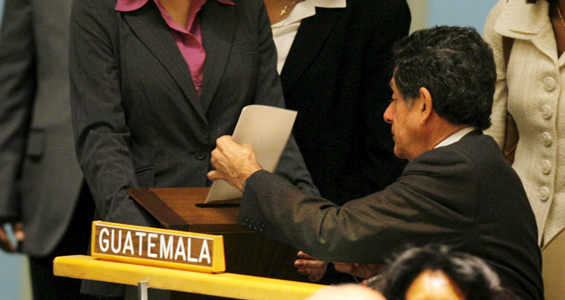Profile: The UN Security Council
There has been debate over increasing the number of permanent Security Council members.

 |
| Non-permanent members are elected by the 192-member General Assembly for two years [EPA] |
The United Nations Security Council (UNSC) – which met for the first time in 1946 – is the arm of the UN charged with maintaining international peace and security.
Its powers are enshrined in the UN charter and include activating peacekeeping operations, imposing international sanctions, and the authorisation of military action.
The body is considered to be the powerhouse of the UN, with its decisions exercised through UN Security Council resolutions.
The body has five permanent members – the United Kingdom, France, USA, China and Russia and 10 non-permanent members.
The non-permanent members are elected by the 192-member General Assembly for two-year terms starting on 1 January, with five replaced each year.
Candidates must get a two-thirds majority of members voting, with ballots held in secret.
The council’s aim is to create a regional balance within the 15 members, with one East European, two Latin American members, five Asian or African members and two members from Western Europe or other regions chosen.
Members must always be present at the UN headquarters in New York so that the council can assemble at any time.
The presidency of the Security Council rotates in alphabetical order of the Security Council member nations’ names in English.
Council presidents must follow strict procedures in management of business and be neutral in public statements.
Nevertheless they can wield important influence on scheduling the agenda and other formalities.
Voting procedure
Resolutions are drawn up by one or more members of the council and passed around privately to the others.
Consultations then take place in which the drafts can be negotiated or altered.
When agreed to by all members, the resolution is put forward to the council.
Decisions on what the council calls “substantive” issues need a majority of nine votes before they can be approved, including either votes or abstentions from all five permanent members.
The issue as to wheth-er an issue is substantive or not is the matter of much conjecture.
The permanent members have the power to veto any major resolution put forward.
Permanent debate
There has been much debate about increasing the number of permanent members. Frontrunners are considered to be India, Japan, Brazil and Germany.
Financially, Japan and Germany are the UN’s second and third largest funders.
Brazil, which is South America’s largest country and India, the world’s largest democracy and second most populous country, are two of the biggest contributors of troops for UN-approved peace-keeping missions.
The council aims to stop any fighting in the world from taking place in the first place and once a conflict has begun its primary aim is to seek a diplomatic solution.
If fighting continues, the council may try to initiate a ceasefire and send in peacekeepers.
Military action against an aggressor is always its last resort.